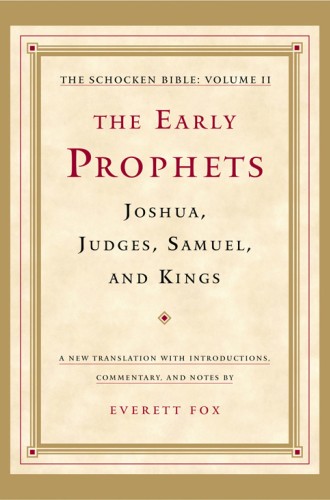Found in translation
George Steiner, in a learned article on translation and hermeneutics, once asserted, “The translator invades, extracts, and brings home.” He recognizes that translation is not simply rendering a passage from one language into another, but is a matter of shaping and determining the world into which the reader enters. In this remarkable volume of translation, Everett Fox of Clark University has done all that Steiner proposes. He has invaded our common assumptions about the Bible, extracted accents and cadences, and brought the text home to us in fresh and compelling ways.
The volume is a continuation of Fox’s prodigious project of translation known as The Schocken Bible. He has already completed the five books of the Torah, and in this volume takes up the “former Prophets” of the Hebrew canon that in Christian parlance are dubbed historical books. Along with fresh translation, Fox offers succinct notes of commentary that are well informed by current scholarship and consistently take a commonsense balanced position.
Fox clearly lays out his intention for the translation. A century ago Martin Buber and Franz Rosenzweig rendered the Hebrew Bible into German. Their aim was to attend to the sounds of the text for oral reading, so that the German would be informed by the cadences of the Hebrew text. Fox stands in that tradition. Indeed, his teacher at Brandeis, Nahum Glatzer, was a graduate assistant to Rosenzweig in the last days of the latter’s life, so there is a self-conscious continuity from Buber and Rosenzweig to the present work. More than that, Buber’s famous attention to the dialogic is reflected in this translation, for Fox understands that translation is not a once-and-for-all accomplishment, but an ongoing dialogic enterprise between text and reader. Fox explains: “To what is on the printed page you will have to add your own voice and your own struggles. . . . that mandate of entering into the spirit of the text as a part of the dialogue is still very much the point of translating the Bible.”




